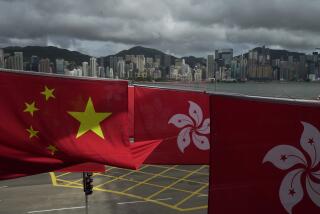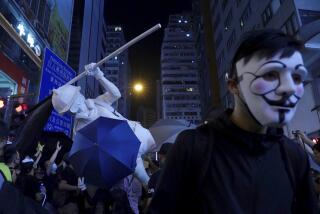Billionaire Touts Hong Kong as Base for U.N.
HONG KONG — One of Asia’s richest men and biggest landlords has an idea to ease tensions over Hong Kong when China regains control of the prosperous British colony in 1997--rent it.
Hong Kong-based billionaire Stanley Ho hopes China will agree to lease the colony to the United Nations as the world body’s Asian headquarters, thus avoiding the problems of a Communist government ruling a capitalist outpost.
The idea, which Ho says came to him in a dream after he dozed while listening to a recording of Schumann’s “Fantaisie,” is the latest of several schemes to save Hong Kong from expected oppression and economic downturn when China takes control in 1997.
Gathers Support
Although the mainland has promised to allow Hong Kong to retain its capitalist system for 50 years after 1997 as a special region, tens of thousands of disbelieving residents have already left for other countries.
The June crackdown on the pro-democracy movement in Beijing depressed confidence further and residents have swarmed to the colony’s foreign consulates, hoping to join the exodus.
The idea of China offering to lease Hong Kong to the United Nations might appear unrealistic, but unlike plans to move the colony’s 5.7 million people to a “new Hong Kong” in the Scottish highlands or Australia, the concept has garnered supporters.
“We think it’s entirely feasible,” said Cliff Reece, chairman of the Hong Kong Foundation 3000, a business lobby group. “Hong Kong is an international city. It would be the perfect place for the United Nations.”
Hong Kong government officials called the idea foolish. The U.S. consul general had no comment, and Chinese officials in the colony said they had no knowledge of Ho’s plan.
Reece, however, said his foundation has approached “senior mainland officials” with the idea and received “very favorable responses.” He said he was unable to identify the officials involved because none wanted to be publicly linked to the plan.
“China would gain a lot of prestige by having the United Nations on its soil,” he said.
Ho, the operator of casinos in the nearby Portuguese territory of Macao and elsewhere in Asia, as well as interests in construction, transport and entertainment industries, said the plan would be in China’s best economic interest as well as convey great prestige to the Beijing government.
“As things stand now, China is the big loser,” he said. “When they take over Hong Kong, all the people will have already left. If they agree to lease Hong Kong to the United Nations, confidence will soar, Hong Kong will become the Switzerland of Asia and people will keep investing here.”
Ho said his plan could be put into action without altering the 1984 Sino-British Joint Declaration on Hong Kong, which allows the colony to retain its capitalist system for 50 years after 1997, while China rules it as a “special administrative region.”
“The policy of ‘one country, two systems,’ would not change,” he said. “China would still have sovereignty over Hong Kong.”
Proponents of the scheme said persuading key nations to support it would be easy. France and the United States should back the idea, they said, because it would help assure China’s respect for human rights in post-1997 Hong Kong.
“The Chinese aren’t going to assault the United Nations,” Reece said.
Good for Britain
As for Britain, Ho said the colonial master of Hong Kong would jump at a chance to support an idea relieving it of moral responsibility for the 3.5 million holders of British overseas passports in the colony.
Britain has refused to grant right of abode in the United Kingdom to the overseas passport holders, sparking increased anxiety in the colony.
The plan’s supporters said the Soviet Union also should back the idea because it would put a major U.N. facility in Asia.
If the future goes according to Ho’s dream, Chinese leader Deng Xiaoping would announce his plan to lease Hong Kong to the United Nations on Oct. 1--the 40th anniversary of the Communist revolution in China.
But Ho is willing to settle for even less.
“All the old boy has to do is even suggest that he is considering the idea and confidence in Hong Kong will be restored overnight,” Ho said.
Although Hong Kong government officials admitted that Ho’s analysis probably was true, many were more than a little skeptical of the idea.
Stephen Bradley, Hong Kong deputy political adviser, said pursuing the plan was “totally foolish.”
“I should think the idea is quite unlikely,” he said. “I shall be fascinated to hear what the Chinese have to say about it.”
Officials at the New China News Agency, China’s official news agency and its unofficial diplomatic representative in Hong Kong, not only refuse to comment on the idea but say they’ve never heard of it.
U.S. Consul General Donald Anderson admitted talking to Reece about the idea, but he refused to comment on the plan.
Undaunted by skeptics, the scheme’s supporters say they are hiring lobby groups in Washington and New York to sell the idea to the U.S. government and the United Nations.
“We have to keep trying anything we can,” Ho said. “People must continue to invest in Hong Kong or it will die.”
More to Read
Sign up for Essential California
The most important California stories and recommendations in your inbox every morning.
You may occasionally receive promotional content from the Los Angeles Times.









